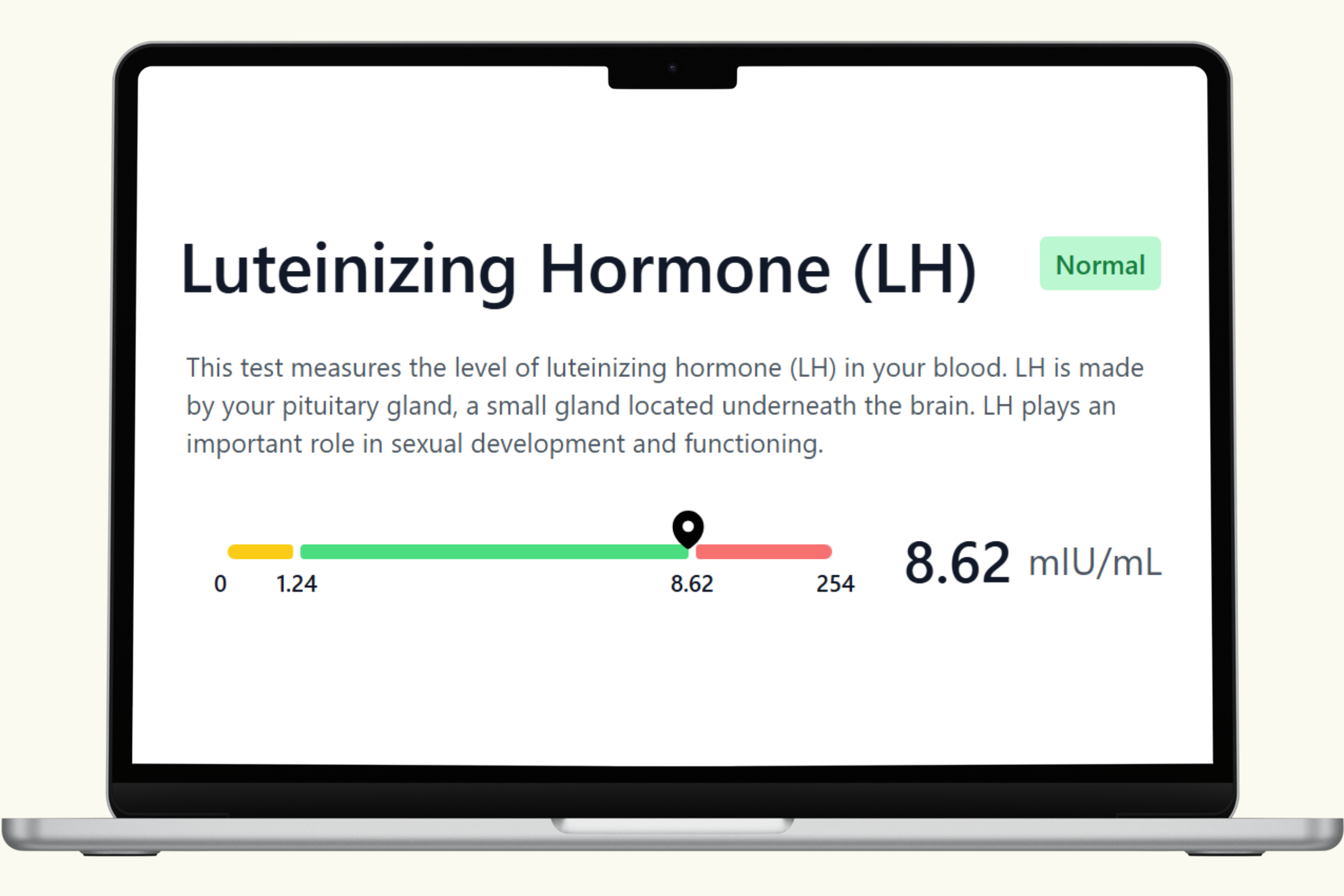Luteinizing Hormone (LH) Blood Test: A Critical Fertility Marker
The Luteinizing Hormone (LH) Blood Test, included in the PlexusDx Women’s Fertility Blood Test, provides essential insight into reproductive health and hormonal balance. LH is produced by the pituitary gland and plays a central role in regulating the menstrual cycle, ovulation, and early pregnancy support. Because LH is tightly linked with estradiol, progesterone, and follicle-stimulating hormone (FSH), measuring LH is one of the most effective ways to evaluate fertility potential and diagnose reproductive concerns.
What is LH and Why is it Important?
LH is a gonadotropin hormone that coordinates several critical reproductive functions in women:
- Stimulating estradiol production: LH helps ovarian follicles produce estradiol, which thickens the uterine lining for implantation.
- Triggering ovulation: A sharp rise in LH—known as the “LH surge”—signals the ovary to release a mature egg.
- Supporting early pregnancy: After ovulation, LH stimulates the corpus luteum to produce progesterone, which stabilizes the uterine lining for embryo implantation.
- Postmenopause: LH levels naturally rise as ovarian hormone production declines, providing another marker of menopausal status.
Why Test LH?
Doctors may order an LH test to evaluate a wide range of reproductive and hormonal concerns. Common reasons include:
- Fertility challenges: LH measurement helps determine if ovulation is occurring normally.
- Irregular or absent periods: Abnormal LH may explain cycle disruptions.
- Polycystic ovary syndrome (PCOS): Women with PCOS often have an elevated LH-to-FSH ratio.
- Low sex drive or hormone imbalances: LH testing can help identify pituitary or ovarian causes.
- Menopausal transition: Rising LH levels may indicate perimenopause or menopause.
Reference Ranges for LH
Because LH levels vary throughout the menstrual cycle, results are interpreted in context:
- Follicular phase: 1.9 – 12.5 IU/L
- Mid-cycle (LH surge): 8.7 – 76.3 IU/L
- Luteal phase: 0.5 – 16.9 IU/L
- Postmenopause: 15.9 – 54.0 IU/L
Optimal fertility range: The LH surge is essential for ovulation and usually occurs about 24–36 hours before egg release. Tracking LH levels can therefore help women identify their most fertile days.
How LH Affects Fertility
Balanced LH levels are essential for healthy fertility:
- Low LH: May indicate pituitary dysfunction, hypothalamic disorders, or low ovarian activity, which can prevent ovulation.
- High LH: May suggest PCOS, premature ovarian failure, or menopause. Elevated LH without a proper cycle rhythm can interfere with fertility.
LH and Other Hormones
LH does not act alone. It works closely with other reproductive hormones:
- FSH (Follicle-Stimulating Hormone): Stimulates follicle growth, while LH triggers ovulation of the mature follicle.
- Estradiol (E2): Rising estradiol from developing follicles triggers the LH surge.
- Progesterone: After ovulation, LH supports progesterone production to maintain the uterine lining.
This hormonal interplay explains why fertility panels often measure LH alongside FSH, estradiol, progesterone, and TSH for a complete picture of reproductive health.
Symptoms of LH Imbalances
Women with abnormal LH levels may experience symptoms such as:
- Irregular or missed periods
- Difficulty conceiving
- Signs of PCOS (irregular cycles, acne, weight gain, excess hair growth)
- Hot flashes, night sweats, or vaginal dryness (if postmenopausal)
- Low libido or hormonal imbalances
Specimen Collection with PlexusDx
The LH Blood Test with PlexusDx uses an at-home dried blood spot method with an ADX card. With just a simple finger prick, a few drops of blood are collected and mailed to the lab for professional analysis. This convenient method provides accurate results without needing a clinic visit or blood draw.
Benefits of LH Testing with PlexusDx
- At-home convenience: No need for scheduling lab appointments.
- Part of a full fertility panel: LH is measured alongside other key hormones to provide comprehensive reproductive insights.
- Accurate timing for ovulation: Helps identify fertile windows and improve conception chances.
- HSA/FSA eligible: Covered by pre-tax healthcare spending accounts.
- Actionable results: Supports discussions with healthcare providers for fertility and hormone management.
What to Do if LH Levels Are Abnormal
If your LH levels fall outside the expected range, your healthcare provider may recommend:
- Additional hormone testing: FSH, estradiol, progesterone, or AMH for a fuller fertility assessment.
- Fertility treatments: Ovulation induction, IVF, or hormonal therapies depending on results.
- Medical evaluation: Checking for PCOS, pituitary disorders, or premature ovarian insufficiency.
- Lifestyle strategies: Weight management, balanced nutrition, and stress reduction can help regulate hormones naturally.
Conclusion
The Luteinizing Hormone (LH) Blood Test is a cornerstone of fertility testing, offering key insights into ovulation, hormone balance, and reproductive potential. By measuring LH levels, women can better understand their menstrual cycles, detect underlying conditions like PCOS, and optimize their chances of conception. With the PlexusDx Women’s Fertility Blood Test, you can access accurate, at-home hormone testing and take proactive steps in your fertility journey with confidence.

Share:
Free T4 Blood Test
Anti-Mullerian Hormone (AMH) Blood Test